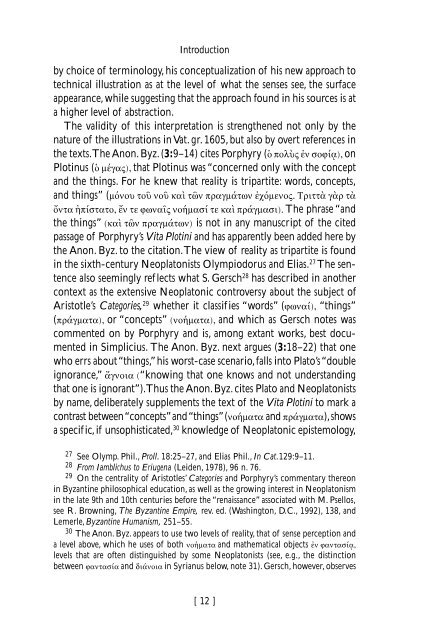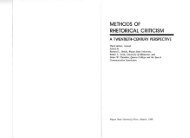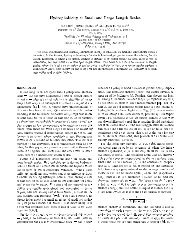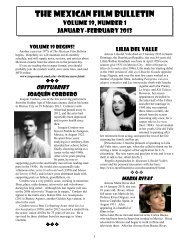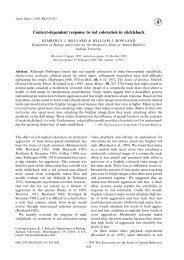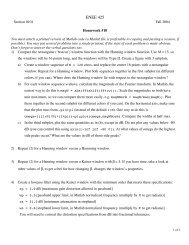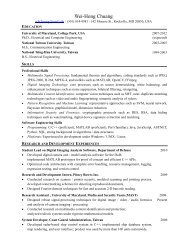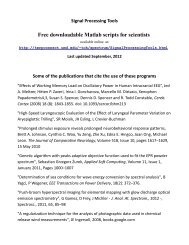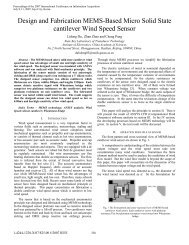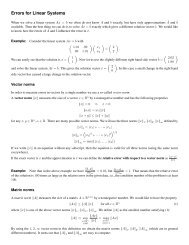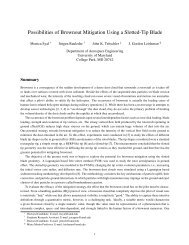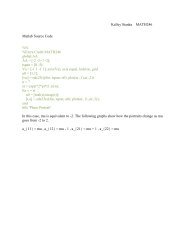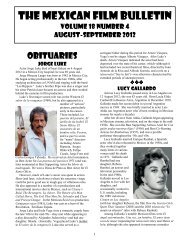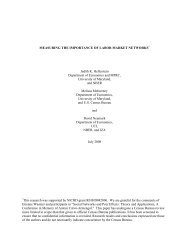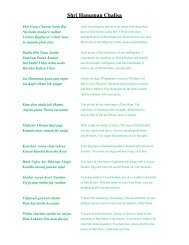Siegecraft - TerpConnect - University of Maryland
Siegecraft - TerpConnect - University of Maryland
Siegecraft - TerpConnect - University of Maryland
You also want an ePaper? Increase the reach of your titles
YUMPU automatically turns print PDFs into web optimized ePapers that Google loves.
Introduction<br />
by choice <strong>of</strong> terminology, his conceptualization <strong>of</strong> his new approach to<br />
technical illustration as at the level <strong>of</strong> what the senses see, the surface<br />
appearance, while suggesting that the approach found in his sources is at<br />
a higher level <strong>of</strong> abstraction.<br />
The validity <strong>of</strong> this interpretation is strengthened not only by the<br />
nature <strong>of</strong> the illustrations in Vat. gr. 1605, but also by overt references in<br />
the texts. The Anon. Byz. (3:9–14) cites Porphyry (ı polÁw §n s<strong>of</strong>¤&), on<br />
Plotinus (ı m°gaw), that Plotinus was “concerned only with the concept<br />
and the things. For he knew that reality is tripartite: words, concepts,<br />
and things” (mÒnou toË noË ka‹ t«n pragmãtvn §xÒmenow. Trittå går tå<br />
ˆnta ±p¤stato, n te fvna›w noÆmas¤ te ka‹ prãgmasi). The phrase “and<br />
the things” (ka‹ t«n pragmãtvn) is not in any manuscript <strong>of</strong> the cited<br />
passage <strong>of</strong> Porphyry’s Vita Plotini and has apparently been added here by<br />
the Anon. Byz. to the citation. The view <strong>of</strong> reality as tripartite is found<br />
in the sixth-century Neoplatonists Olympiodorus and Elias. 27 The sentence<br />
also seemingly reflects what S. Gersch 28 has described in another<br />
context as the extensive Neoplatonic controversy about the subject <strong>of</strong><br />
Aristotle’s Categories, 29 whether it classifies “words” (fvna¤), “things”<br />
(prãgmata), or “concepts” (noÆmata), and which as Gersch notes was<br />
commented on by Porphyry and is, among extant works, best documented<br />
in Simplicius. The Anon. Byz. next argues (3:18–22) that one<br />
who errs about “things,” his worst-case scenario, falls into Plato’s “double<br />
ignorance,” êgnoia (“knowing that one knows and not understanding<br />
that one is ignorant”). Thus the Anon. Byz. cites Plato and Neoplatonists<br />
by name, deliberately supplements the text <strong>of</strong> the Vita Plotini to mark a<br />
contrast between “concepts” and “things” (noÆmata and prãgmata), shows<br />
a specific, if unsophisticated, 30 knowledge <strong>of</strong> Neoplatonic epistemology,<br />
27 See Olymp. Phil., Proll. 18:25–27, and Elias Phil., In Cat.129:9–11.<br />
28 From Iamblichus to Eriugena (Leiden, 1978), 96 n. 76.<br />
29 On the centrality <strong>of</strong> Aristotles’ Categories and Porphyry’s commentary thereon<br />
in Byzantine philosophical education, as well as the growing interest in Neoplatonism<br />
in the late 9th and 10th centuries before the “renaissance” associated with M. Psellos,<br />
see R. Browning, The Byzantine Empire, rev. ed. (Washington, D.C., 1992), 138, and<br />
Lemerle, Byzantine Humanism, 251–55.<br />
30 The Anon. Byz. appears to use two levels <strong>of</strong> reality, that <strong>of</strong> sense perception and<br />
a level above, which he uses <strong>of</strong> both noÆmata and mathematical objects §n fantas¤&,<br />
levels that are <strong>of</strong>ten distinguished by some Neoplatonists (see, e.g., the distinction<br />
between fantas¤a and diãnoia in Syrianus below, note 31). Gersch, however, observes<br />
[ 12 ]


